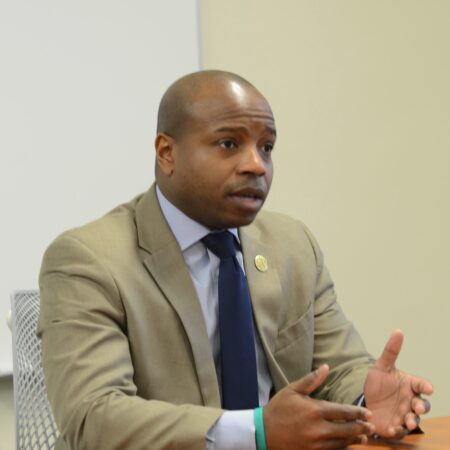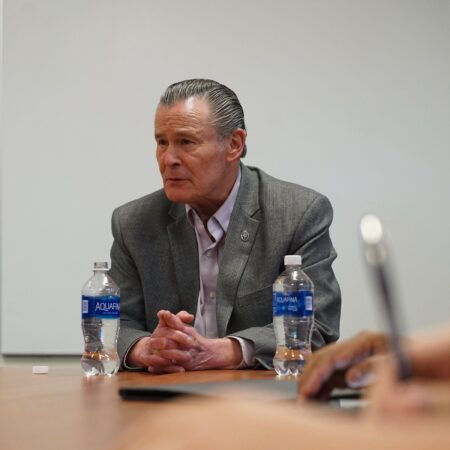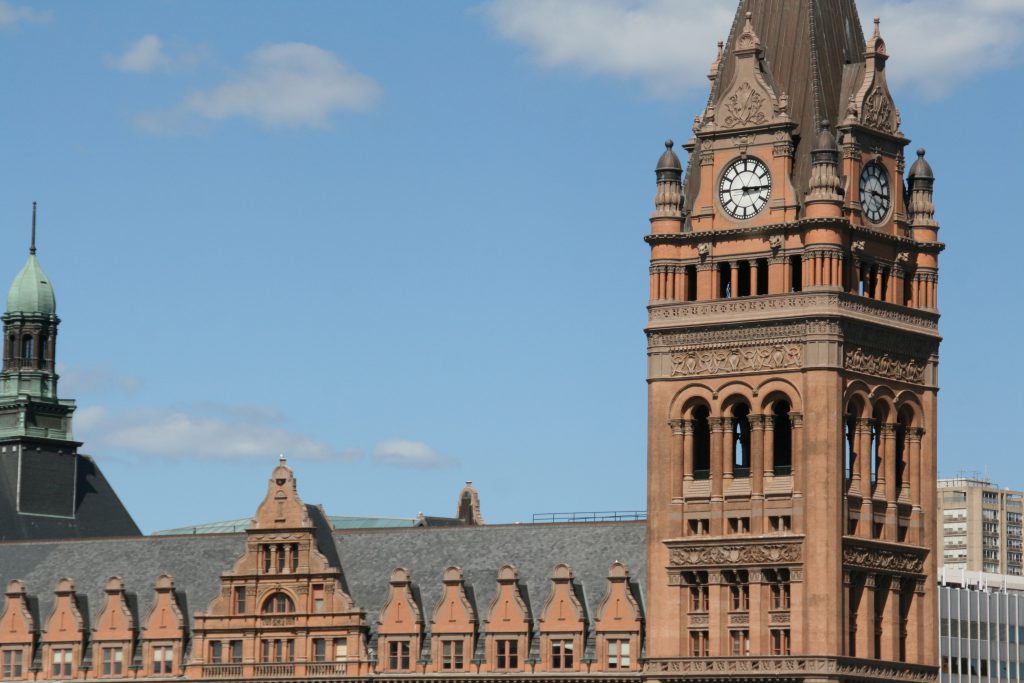Where Mayoral Candidates Stand On Issues
How Johnson, Donovan would handle crime, lead poisoning, housing, jobs, education, city pensions.
Milwaukee’s mayoral election is Tuesday. In separate interviews, Milwaukee Neighborhood News Service staff asked the two candidates – Acting Mayor Cavalier Johnson and former Ald. Bob Donovan – about their plans for the city if elected. NNS also invited community members to submit questions for the candidates.
Donovan focused heavily on crime in the city and said he would create advisory committees to get expert opinions on many issues. Johnson discussed jobs and economic development, outlining a vision for the city growing to a population of 1 million.
Though not an exhaustive list, here is how they differ – and agree – on many of the city’s pressing issues:
Crime
Milwaukee Police Department funding and community relationship
Donovan said favors increasing the number of officers in the Milwaukee Police Department and wanted to see more community-oriented policing efforts, including beat cops being deployed in neighborhoods to renew community trust.
Johnson was also in favor of investing in police but also touted his work to get Eight Can’t Wait policies implemented in the police department. The policies are meant to reduce the likelihood of citizen death in a police encounter.
The two men worked together to secure a $10 million grant to hire 30 more police officers in early 2021, according to the Milwaukee Journal Sentinel.
Reckless driving
Johnson said he wants to see increased support for the police department’s Traffic Safety Unit and that he would support public works developments, such as expanding curbs and concrete-protected bike lanes, to discourage reckless driving,
“When the social norms around driving deteriorate, that’s how you get to the environment that we have now in terms of reckless driving,” Johnson said.
Donovan said reckless driving is nothing new and blamed the recent increase on “an atmosphere of lawlessness that has taken over a significant portion of Milwaukee.”
He blamed a lack of consequences for reckless drivers as one reason for a surge in incidents.
Office of Violence Prevention

Acting Mayor Cavalier Johnson is focusing on jobs and economic development in his campaign. Photo by Sue Vliet/NNS.
The Milwaukee Health Department’s Office of Violence Prevention is an agency that works to disrupt violence at the neighborhood level through trusted messengers and community engagement. It was established in 2008 and has issued the Blueprint For Peace, a community-driven agenda that seeks to address the root causes of violence in Milwaukee.
Donovan said he has concerns about the Office of Violence Prevention.
“I am not at all convinced that the Office of Violence Prevention … has proven its success. It’s imperative that any agency that we fund can show us as a community what they’ve accomplished. I haven’t seen that information,” he said.
Johnson said he supports the Office of Violence Prevention and pledged to contribute $5 million to its funding if elected mayor. Violent crime rates were decreasing before the pandemic, showing evidence of successful violence interruption from the department, he said.
“I do believe that violence prevention is a tenet of public health and that we should approach it that way,” Johnson said. “The doctors, the ones who treat victims of gun violence in our hospitals, think it’s a public health issue. Our health department thinks it’s a public health issue, and that’s exactly how I would approach it, too.”
Health
Public health
Donovan said that he wants to establish a medical advisory committee to confer with the city on pressing health challenges, including mental health and health disparities. He also wants to see a more active public health nurse initiative and mobile clinics to focus on underserved areas in the city.
Johnson said he would like to see an increase in health insurance enrollment efforts and door-to-door outreach by the city’s public health arms, including the health department.
“I’d certainly be supportive of the health department coming out of the walls of its downtown offices or its clinics in the neighborhoods and actually engaging people where they are in the places where they live so that they know they have access,” Johnson said.
Lead exposure
Donovan said that he would leverage dollars from a number of funding sources to remove lead laterals, or water pipes that have lead in them. He said he hopes to reduce the city’s timeline for lead removals, aiming to replace Milwaukee’s 70,000 lead laterals in 10 years.
The project is slated to take about 70 years at its current pace, hovering around 1,000 removals a year.
Johnson said that he felt lead was a huge issue and hoped to continue working with federal partners. He said the city would likely not be able to invest as much as it wants in the coming years due to the upcoming pension crisis.
Johnson also noted the importance of mitigating lead exposure in paint and soil around households.
Housing

Former Ald. Bob Donovan has centered his campaign on reducing crime in the city and supporting the Milwaukee Police Department. Photo by Adam Carr/NNS.
Donovan said that he would appoint a housing czar to oversee the city’s efforts to help residents .
“There are north of 20 agencies that work on housing … but they’re not necessarily working together,” Donovan said. “The role of that housing director would be to bring them together and coordinate a plan and strategy to address that.”
Johnson said he supports the continuing development of interagency housing policies to better align the efforts of separate agencies around the city. He also pointed to the $43 million investment of American Rescue Plan Act dollars into housing programs and felt the city had invested the money wisely.
Jobs
Johnson said he wants to see growth in “family-supporting jobs” for people in the city. He called for more involvement with Milwaukee in the tech industry and said that he would try to connect the city with green energy production emphasized by the Biden administration.
“When the president of the United States talks about building back better and transitioning our economy over into a more green economy, I can’t think of a place better than Milwaukee to be a flagship for that,” Johnson said.
Johnson also said transportation is a major barrier for employment. He said he would work to establish a regional transportation system if elected to help people in the city commute to jobs in the suburbs.
Donovan said one of the main contributors to a lack of jobs is crime. He emphasized the need to reduce crime rates before potential employers would become interested. He also said bureaucracy in city government has hindered businesses in the past, and he would aim to remove it if elected.
“When you look at any business who (is) considering settling in a community, the first thing they look at is the crime,” he said.
Education
Johnson said he wants to improve access to early education, touting the Office of Early Childhood Initiatives, which he helped create as a co-chair of the Early Education Task Force. The task force provides more day care opportunities in the city.
Johnson also said he viewed the role of mayor as an opportunity to address root factors that might affect schooling, including food insecurity, economic insecurity, violence and trauma.
Donovan said he would create an educational advisory committee to address issues in schools and supported improving access to the city’s charter and private schools.
Donovan and Johnson both oppose the recent proposal to break up Milwaukee Public Schools, a plan that would split the current system into four to eight smaller districts starting in 2024.
City spending and pensions
One of the looming issues for the city is a spike in pension payouts. The city’s pension contribution is expected to nearly double next year, jumping from $71 million to roughly $130 million with a sustained increase over the following years. The financial constraint could force the city to lose nearly a quarter of its workforce by 2025, according to the Milwaukee Journal Sentinel.
Johnson said he did not want to cut substantial funding from city departments, including the police department.
Donovan said that he would seek a partnership with the state to address the problem and audit the city government to find out how effectively the city’s dollars are being spent.
A plan that distinguishes them from their opponent
In their respective interviews, Johnson and Donovan were asked for a game-changing plan that differentiates them from their opponent.
Donovan said his plan was a scholarship program for the city that would allow income-disadvantaged children with certain grade criteria to advance to secondary education and trade schools.
“I think that would be a wonderful thing for Milwaukee,” said Donovan, who pointed out the advantages of a well-educated workforce.
Johnson pointed to his plan for economic development in the city, which he said will strive to make a safer and more prosperous community within the city.
“I want to grow the city. … I don’t think that we should be nibbling around the edges trying to get to 600,000 people again,” he said. “We should be trying to grow to a million people or more. But the only way we’re going do that is by making sure that we have a stronger city, a safer city and a city that provides economic prosperity for everybody that lives here.”
Compare and contrast: How Milwaukee’s mayoral candidates stand – and differ – on the issues was originally published by the Milwaukee Neighborhood News Service.
More about the 2022 Mayoral Race
- Johnson Carried 81% of City’s Wards - John D. Johnson - Apr 6th, 2022
- Meet Milwaukee’s New Mayor Cavalier Johnson - Jeramey Jannene - Apr 5th, 2022
- Where Mayoral Candidates Stand On Issues - Matt Martinez - Apr 3rd, 2022
- What Do Milwaukee Mayors Do? - Milwaukee Neighborhood News Service - Apr 3rd, 2022
- Acting Mayor Johnson’s Brother Arrested On Felony Charges - Jeramey Jannene - Apr 1st, 2022
- Hundreds watch parent-led virtual listening sessions on K-12 education with mayoral candidates - City Forward Collective - Mar 30th, 2022
- Murphy’s Law: Let’s Not Whitewash Bob Donovan - Bruce Murphy - Mar 28th, 2022
- Donovan, Johnson Clash On Drop Boxes - Jeramey Jannene - Mar 22nd, 2022
- Bob Donovan vs The Clown - Jeramey Jannene - Mar 22nd, 2022
- Donovan Plans Car Theft “Strike Force” - Jeramey Jannene - Mar 21st, 2022
Read more about 2022 Mayoral Race here
Political Contributions Tracker
Displaying political contributions between people mentioned in this story. Learn more.























Let’s send ol’ Bob back to the suburbs tomorrow. We’ll be doing him a favor.
One of the candidates was arrested 30 years ago for peeping through holes in the men’s room at UWM, and was let off with a ticket after he admitted doing this on numerous occasions for his own pleasure. I wonder which one that was?
If Donovan creates one more advisory committee, I’m gonna throw up!
There is no mention here of the candidates views on climate change and racial inequity. Climate change is already affecting us, with the most severe burden being felt by low-income and minority communities.
The Mayor will have an important role to play in seeing that the city’s Climate and Equity Plan is fully implemented. We can – and must — address housing, transportation, jobs, food production, and racial injustice – while mitigating climate change and creating family-supporting green jobs. Failure to address climate change and economic inequity will worsen these problems and lead to more suffering for those who are least responsible for creating it.